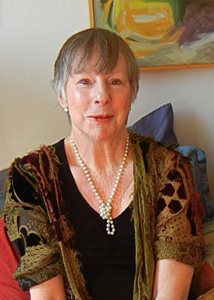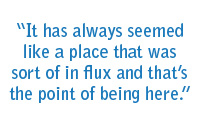 Journalist and author Nancy Weber is known primarily for her non-fiction work “The Life Swap.” Her twenty-some other books include “The Playgroup” and “Brokenhearted,” as well as eight romances written under the byline Jennifer Rose. Currently residing on West Tenth Street, Weber also caters parties and teaches cooking.
Journalist and author Nancy Weber is known primarily for her non-fiction work “The Life Swap.” Her twenty-some other books include “The Playgroup” and “Brokenhearted,” as well as eight romances written under the byline Jennifer Rose. Currently residing on West Tenth Street, Weber also caters parties and teaches cooking.
While growing up in Hartford, Connecticut, writer Nancy Weber was fortunate enough to have parents who were intent on exposing her and her brother to everything New York City had to offer. “I perfectly remember the moment when I was a teenager and we had just seen The Boy Friend at the Cherry Lane Theatre,” she recalls. “There was something about that curve of Commerce Street that brought me to my knees and I said to my parents, ‘I’m going to have to live here when I grow up.’ And they didn’t laugh at me!”
Not only didn’t they laugh, her parents were instrumental in landing Weber her first Village apartment. “I was attending Sarah Lawrence College but I wanted to drop out,” she explains. “My parents offered me the ‘princess deal’ of all times. Since I hated living in the dorms, they suggested I live in Greenwich Village and commute up to school and get my degree that way. So I agreed to it! I ended up on Seventh Avenue South in a triangular apartment and it was total bliss. That was the spring of 1962 and I’ve been in the Village ever since.”
Looking for work as a writer after graduating, Weber landed the “best of all possible first jobs.” “I was editorial assistant on the amusement desk of the New York Post,” she says. “That meant that I was working with guys like Jerry Tallmer, Richard Watts, and Archer Winston and copy editing Earl Wilson.” After a while she began writing for the paper herself, getting the chance to interview Francois Truffaut and Norman Mailer, among others. From here it was on to numerous books and a life’s devotion to the written word. “I just love making sentences,” Weber confesses. “When I’m writing fiction I adore hanging out with my characters. There’s that incredible sense, familiar to so many fiction writers, that you’re not so much creating events as remembering them.” She goes on to articulate the difference for her between writing fiction and non-fiction. “I think it’s very hard for journalists to write fiction because you have to give yourself permission to lie in a way. You have to make things up. There’s something beautiful about facts. And yet making things up or remembering things that didn’t actually happen is a gorgeous experience.”
Does she still remember what the Village was like when she moved into her first apartment? “It was much as it is today,” Weber observes. “It was this little pocket of coziness and warmth. It was so livable, and it still is. I think what I loved most is that it was not homogenous. If we were homogenous it was for reasons of affinity and not because of our backgrounds or our religion or how much money we had. I still feel that heady air of freedom that I first did moving here.”
 While many people would bemoan the changes in the neighborhood, Weber offers another perspective. “I’m the wrong person to ask how the Village has changed,” she admits. “It has always seemed like a place that was sort of in flux and that’s the point of being here. The Village is about change and even though there are certain things that you hope to have preserved, you don’t want everything frozen in amber, either. I can get a little impatient if people go on about life not being the same because you can’t get a croissant at Sutter’s any more. While I can certainly mourn the loss of St. Vincent’s and I guess NYU is a real estate monster, I’m not going to dance at the preservation ball. Some things are going to remain and some things are going to change.”
While many people would bemoan the changes in the neighborhood, Weber offers another perspective. “I’m the wrong person to ask how the Village has changed,” she admits. “It has always seemed like a place that was sort of in flux and that’s the point of being here. The Village is about change and even though there are certain things that you hope to have preserved, you don’t want everything frozen in amber, either. I can get a little impatient if people go on about life not being the same because you can’t get a croissant at Sutter’s any more. While I can certainly mourn the loss of St. Vincent’s and I guess NYU is a real estate monster, I’m not going to dance at the preservation ball. Some things are going to remain and some things are going to change.”
When asked if she has any last words to say about the West Village, Weber laughingly replies, “This isn’t my obit, is it?” Then she grows thoughtful. “I can’t imagine getting tired of it,” she says. “I guess it’s too late to say I want to grow old here, having just turned 70. I have to say, ‘Damn it, I did grow old here!’ I found my magic spot. I just feel so lucky. I think whatever changes come here we will roll with them and the Village will go on being the garden spot of the universe.”
Photo: Maggie Berkvist
